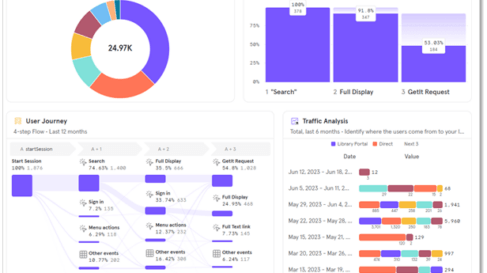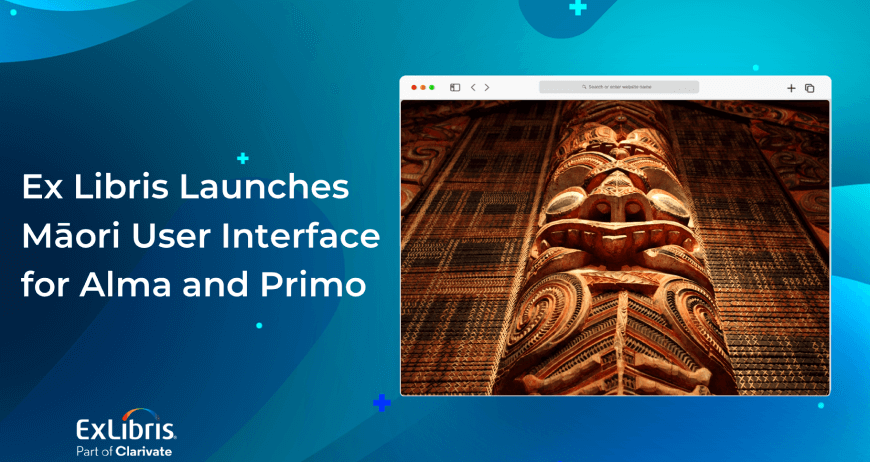By Christine Stohn, Senior Product Manager, Discovery & Delivery, Ex Libris
In previous posts, we looked at different scenarios from the Ex Libris user studies, which gave us a real-world context for our understanding of the library discovery process.
After looking last time at scenarios that highlighted three out of the four core aspects of discovery repeatedly appearing in our research – Search, Exploration and Learning – I’d now like to turn to the fourth concept: Personalization.
Personalization is a process in which the ranking mechanism is adjusted according to the user’s specific discovery context. Two users may initiate the same search, but their needs for material may be very different, depending on their discipline and task. For example, a search for “game theory” may be in reference to economics, but it may equally refer to mathematics. In some contexts users may only be interested in very recent material, while in others they may be looking for the historic context.
Personalized and Anticipatory Discovery
There are generally two forms of personalization, passive and active. Passive, or anticipatory, discovery takes the user’s search history into account in order to predict needs and shape results. For such anticipatory discovery to be effective, though, there needs to be enough past user searches to identify useful patterns of behavior. At the same time, maintaining such records for the purposes of anticipatory discovery raises serious user privacy and personal data security issues.
While services such as Google or Facebook certainly have a critical mass of search histories to generate consistent anticipatory discovery rankings, they are also far less concerned than libraries about privacy issues. To earn and keep user trust, libraries need to constantly juggle the demands of providing improved discovery personalization and preserving user anonymity.
Active personalization (as opposed to anticipatory discovery) involves the user in fine-tuning the search, but doesn’t require any historical user data. While this is less intuitive than passive personalization for the Google-savvy user, it has some distinct advantages. First, it provides transparent search refinement preferences (Primo, for example, offers a choice of disciplines and the option to prefer the most recent material). Second, it allows the user to change any of these preferences at any time; such as, for example, if a student uses library discovery services for two distinct disciplines.
What about Serendipitous Discovery?
Generally, as we move toward greater personalization, we have to be careful not to restrict the user to an echo chamber of information. Intelligent discovery will not jeopardize the serendipity factor in discovery.
In this context, the user whose personalization is completely passive is more likely to fail to look beyond the served-up material than the user who makes conscious and transparent personalization choices. A lack of such transparency can conceal entirely new avenues of exploration in a huge amount of untapped data. There are, of course, other features of modern discovery that help preserve that element of serendipity, such as virtual browsing and automated article recommendation.
A future discovery option may include the use and standardization of information from across several scholarly systems for enhanced personalization services. Roger Schonfeld discussed a number of considerations for this option his very interesting post “Data for Discovery” on the Scholarly Kitchen blog.
Personalization remains an interesting topic in discovery services. Specifically, the value of usage data and user profiles is becoming an important area of research in current Library Studies. I am sure we will see many more enriching discussions in this field.
You are also welcome to download our white paper: How Do Users Search and Discover.
You might also be interested in

Alma
Content
Primo
Artificial Intelligence
December 18, 2024 |
4 min read
Artificial Intelligence Blog Series: Harnessing Academic AI – Insights from Clarivate

Alma
Leganto
Primo
Artificial Intelligence
October 26, 2024 |
3 min read
Artificial Intelligence Blog Series: Meet Knowledge Assistant, Your Guide to the Ex Libris Knowledge Center

Primo
Artificial Intelligence
Higher Education
Research
September 23, 2024 |
4 min read
Elevate User Engagement with Advanced Analytics: Ex Libris Primo Partners with Mixpanel
Great library experiences start with software
Download whitepaper

Primo
Artificial Intelligence
Higher Education
Research
June 19, 2024 |
4 min read
Artificial Intelligence Blog Series: Meet Primo Research Assistant

Primo
January 30, 2024 |
3 min read
Revolutionizing Library Discovery: The Journey to a New UX for Primo Discovery

Primo
Artificial Intelligence
November 23, 2023 |
4 min read
Artificial Intelligence Blog Series: Prioritizing Conversational Discovery at Ex Libris

Alma
Leganto
Primo
Rapido
October 29, 2023 |
4 min read
Why academic libraries are modernizing the user experience

Alma
Primo
July 28, 2022 |
3 min read
Ex Libris Launches Māori User Interface for Alma and Primo

